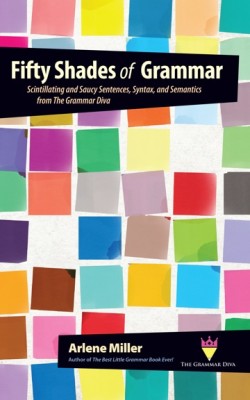 In last week’s post, we talked about introductory words, phrases, and clauses that should be followed by commas at the start of a sentence. Well, the same types of things can be found in the middle of a sentence as well. In this post, we are going to talk about words that can come in the middle of the sentence and interrupt the sentence, so to speak. We will talk about phrases and clauses in the middle (and end) of sentences in the next posts.
In last week’s post, we talked about introductory words, phrases, and clauses that should be followed by commas at the start of a sentence. Well, the same types of things can be found in the middle of a sentence as well. In this post, we are going to talk about words that can come in the middle of the sentence and interrupt the sentence, so to speak. We will talk about phrases and clauses in the middle (and end) of sentences in the next posts.
Sometimes we put commas around interrupting words. And then, sometimes we don’t. The general rule is that if the word is added information and not necessary to the meaning of the sentence, use commas around it. Make sure you use two commas, one before and one after.
1.You don’t usually find transition words like first, next, last, and finally in the middle of a sentence, but you could. And when they are in the middle of a sentence, you generally would not use commas, because they are now adverbs or adjectives and not really transition words:
- I next put the chocolate into the batter.
- I see that you finally bought a new car.
- The step that I would do last is making the frosting.
But in a compound sentence you might have a transition word “in the middle.”
- I put the chocolate into the batter, and, finally, I made the frosting.
- I put the chocolate into the batter, and finally I made the frosting.
That example above could go either way. The first sentence shows finally being used as a transition word. The second example, without the commas, seems to use finally as a simply adverb. Either way is fine.
2. However, however, often appears in the middle of a sentence. It generally is set off with commas.
- I know, however, that it was you who stole the cookies! (You could write the same sentence with however at the beginning and just put a comma after it.)
- I know you stole the cookies, however, and I am going to punish you. Also correct.
- I know you stole the cookies, however, I will let you go this time! NOT correct.
Watch out with words like however and therefore. Look at the words before however in the third sentence above: they make a complete sentence. Now look at the words after however: they also make a complete sentence. There is no conjunction; however is not a conjunction that can connect two sentences. Neither is therefore. You need a conjunction, a semicolon, or a period before however, or you have a run-on sentence. Look at the correct examples with however: if you take however out, you have one sentence that makes sense. (for example, I know you stole the cookies, and I am going to punish you.)
3. You don’t usually find words like yes, no, well, or oh in the middle of a sentence. They are generally used at the beginning, so don’t worry about those. Well, I guess you could find yes or no.
- I suppose, yes, you could do that.
- I told her that no, she couldn’t go tonight.
4. You might have a name in the middle of a sentence. It could be direct address (calling someone by name – talking to them), in which case you would set the name off in commas.
- I asked you, June, to clean up after yourself.
- Do you think, Professor Jones, that I could have an extension on my thesis?
But what about this?
- My brother John is visiting for Christmas.
Do you set off John with commas? It depends. What do you think the difference is between these two sentences?
- My brother John is visiting for Christmas.
- My brother, John, is visiting for Christmas.
In the first sentence John is necessary. You can’t leave it out, so it has no commas. Why can’t you leave it out? But in the second sentence, because John is set off with commas. It is not necessary; it is added information. Why?
The most obvious answer here is that in the first sentence you have more than one brother, so you need to identify him. In the second example, you have only one brother, so his name is additional information.
- My wife, Nina, is cooking dinner for the entire family tonight.
Unless you are on Sister Wives, Nina is likely your only wife, so you can set her name off; it’s added information and not identifying which wife.
5. Occasionally you will have other types of words that need to be set of. You might have a participle or a one-word appositive.
- A participle, if you remember, is an adjective, but it is made from a verb. Present participles are end in -ing and function as adjectives rather than as the verb in the sentence. Past participles have the same function, but end in -ed (or are created however the past tense of the particular verb is, for example, written, frozen).
- An appositive is a word or phrase that describes a noun (or a pronoun) that comes right before it (for example, my brother, John).
Usually, participles that come after the noun they describe as well as appositives are set off with commas:
- I set the gift, a sweater, on the chair.
- She made cupcakes, chocolate, for the birthday party.
- The dog, limping, seemed as if he was hurt.
You have probably heard the old “rule” about setting something off in commas if you would pause. That hint seems to work in this case.
- I saw the dog limping down the street. But The dog, limping, ran down the street.
- The pond, frozen, was still dangerous for skating. But you would likely say, The frozen pond was still dangerous for skating.
Yes, commas are confusing! If you are speaking, obviously it makes no difference. But when you write . . . .
6. Other random words are often used as interrupters as well as at the beginning sentences. Many times the commas are optional and depend on how you would say it. Would you pause?
- I can indeed paint your portrait. Or I can, indeed, paint your portrait. Your choice.
- They are, fortunately, safe and sound in their hotel room. or They are fortunately safe and sound in their hotel room. Your choice.
- They are obviously the winners of the contest. Or They are, obviously, the winners of the contest. Your choice, but notice that in this case the commas around obviously actually emphasize it. Commas are sometimes used for that purpose. For emphasis, you could also put dashes around obviously here.
So finally, you get a choice in using commas! Next week, interrupting phrases.
Grammar Diva News:
Here is a link to my radio interview on KRCB’s A Novel Idea.
My interview on Blogtalk Radio will be aired on Sunday, November 22 at 2:30 p.m., and I will post the link as soon as I get it.
It looks as if Fifty Shades of Grammar will be available in a week or two. More later!




Very funny and entertaining 😀
Thank you!
very valuable and understandable …….. need a bit more decription.